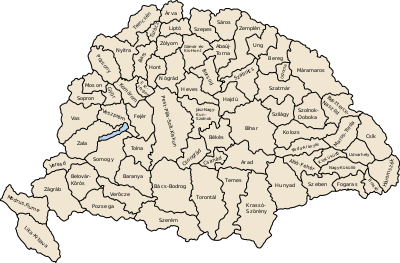Zala County (former)
Zala was an administrative county (comitatus) of the Kingdom of Hungary, bordered by the river Drave to the south. The territory of the former county is now divided between Hungary, Croatia and Slovenia. The capital of the county was Zalaegerszeg.
| Zala County | |
|---|---|
| County of the Kingdom of Hungary | |
| 11th century–1946 | |
.svg.png) Coat of arms
| |
 | |
| Capital | Zalaegerszeg |
| Area | |
| • Coordinates | 46°51′N 16°51′E |
• 1910 | 5,995 km2 (2,315 sq mi) |
• 1930 | 4,877 km2 (1,883 sq mi) |
| Population | |
• 1910 | 466333 |
• 1930 | 365266 |
| History | |
• Established | 11th century |
• Treaty of Trianon | 4 June 1920 |
| 11 April 1941 | |
• Monarchy abolished | 1 February 1946 |
| Today part of | (4,877 km2)
(389 km2) |
Geography
Zala county shared borders with the Austrian land Styria and the Hungarian counties Vas, Veszprém, Somogy, Belovár-Körös and Varasd (the latter two in Croatia-Slavonia). The river Drava (Hungarian: Dráva) river formed its southern border, Lake Balaton its eastern border. The rivers Mura and Zala flowed through the county. Its area was 5974 km² around 1910.
History
Zala county arose as one of the first comitati of the Kingdom of Hungary.
In 1920, by the Treaty of Trianon, the south-west of the county became part of the newly formed Kingdom of Serbs, Croats and Slovenes (from 1929 as Yugoslavia). The remainder stayed in Hungary. Yugoslavian part of it was occupied and annexed again by Hungary between 1941 and 1945 during World War II. In 1950, as part of the Communist reforms of local government, the county's borders were re-drawn again. A small part of former Vas county, north of Zalaegerszeg, went to Zala County. The part of Zala county north of Lake Balaton went to Veszprém County.
Since 1991, when Slovenia and Croatia became independent from Yugoslavia, the part of former Zala county between the rivers Mura and Drava is part of Croatia (region of Međimurje). The area around Lendava is in Slovenia.
Demographics
In 1900, the county had a population of 437,116 people and was composed of the following linguistic communities:[1]
Total:
- Hungarian: 324,087 (74.1%)
- Croatian: 84,904 (19.4%)
- German: 4,917 (1.1%)
- Slovak: 218 (0.1%)
- Romanian: 159 (0.0%)
- Serbian: 13 (0.0%)
- Ruthenian: 2 (0.0%)
- Other or unknown: 22,816 (5.2%)
According to the census of 1900, the county was composed of the following religious communities:[2]
Total:
- Roman Catholic: 402,773 (92.2%)
- Jewish: 13,967 (3.2%)
- Calvinist: 11,793 (2.7%)
- Lutheran: 8,251 (1.9%)
- Greek Catholic: 68 (0.0%)
- Greek Orthodox: 108 (0.0%)
- Unitarian: 32 (0.0%)
- Other or unknown: 124 (0.0%)
In 1910, the county had a population of 466,333 people and was composed of the following linguistic communities:[3]

Total:
- Hungarian: 347,167 (74.45%)
- Croatian: 91,909 (19.71%)
- German: 3,889 (0.83%)
- Slovak: 233 (0.05%)
- Serbian: 56 (0.01%)
- Romanian: 44 (0.01%)
- Ruthenian: 3 (0.0%)
- Other: 23,032 (4.94%)
According to the census of 1910, the county was composed of the following religious communities:[4]
Total:
Subdivisions
In the early 20th century, the subdivisions of Zala county were:

| Districts (járás) | |
|---|---|
| District | Capital |
| Alsólendva | Alsólendva, SI Lendava |
| Balatonfüred | Balatonfüred |
| Csáktornya | Csáktornya, HR Čakovec |
| Keszthely | Keszthely |
| Letenye | Letenye |
| Nagykanizsa | Nagykanizsa |
| Nova | Nova |
| Pacsa | Pacsa |
| Perlak | Perlak, HR Prelog |
| Sümeg | Sümeg |
| Tapolca | Tapolca |
| Zalaegerszeg | Zalaegerszeg |
| Zalaszentgrót | Zalaszentgrót |
| Urban districts (rendezett tanácsú város) | |
| Nagykanizsa | |
| Zalaegerszeg | |
The towns of Prelog and Čakovec are in Croatia; Lendava is in Slovenia.
- "KlimoTheca :: Könyvtár". Kt.lib.pte.hu. Retrieved 6 December 2012.
- "KlimoTheca :: Könyvtár". Kt.lib.pte.hu. Retrieved 6 December 2012.
- "KlimoTheca :: Könyvtár". Kt.lib.pte.hu. Retrieved 6 December 2012.
- "KlimoTheca :: Könyvtár". Kt.lib.pte.hu. Retrieved 6 December 2012.
